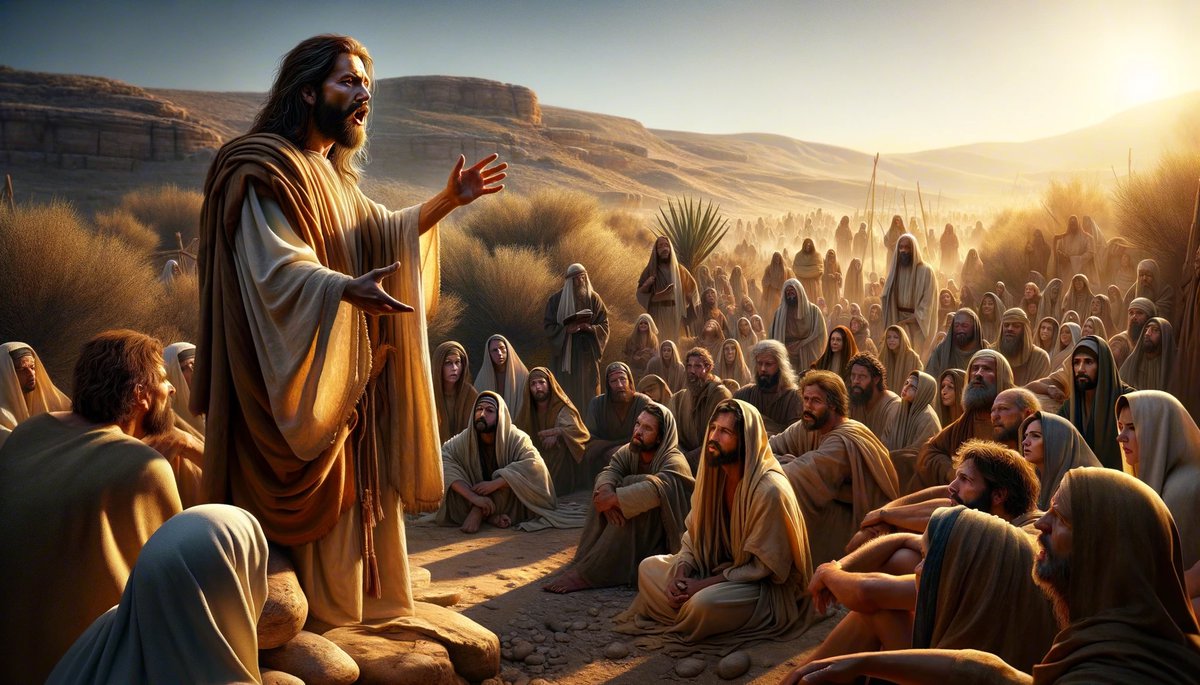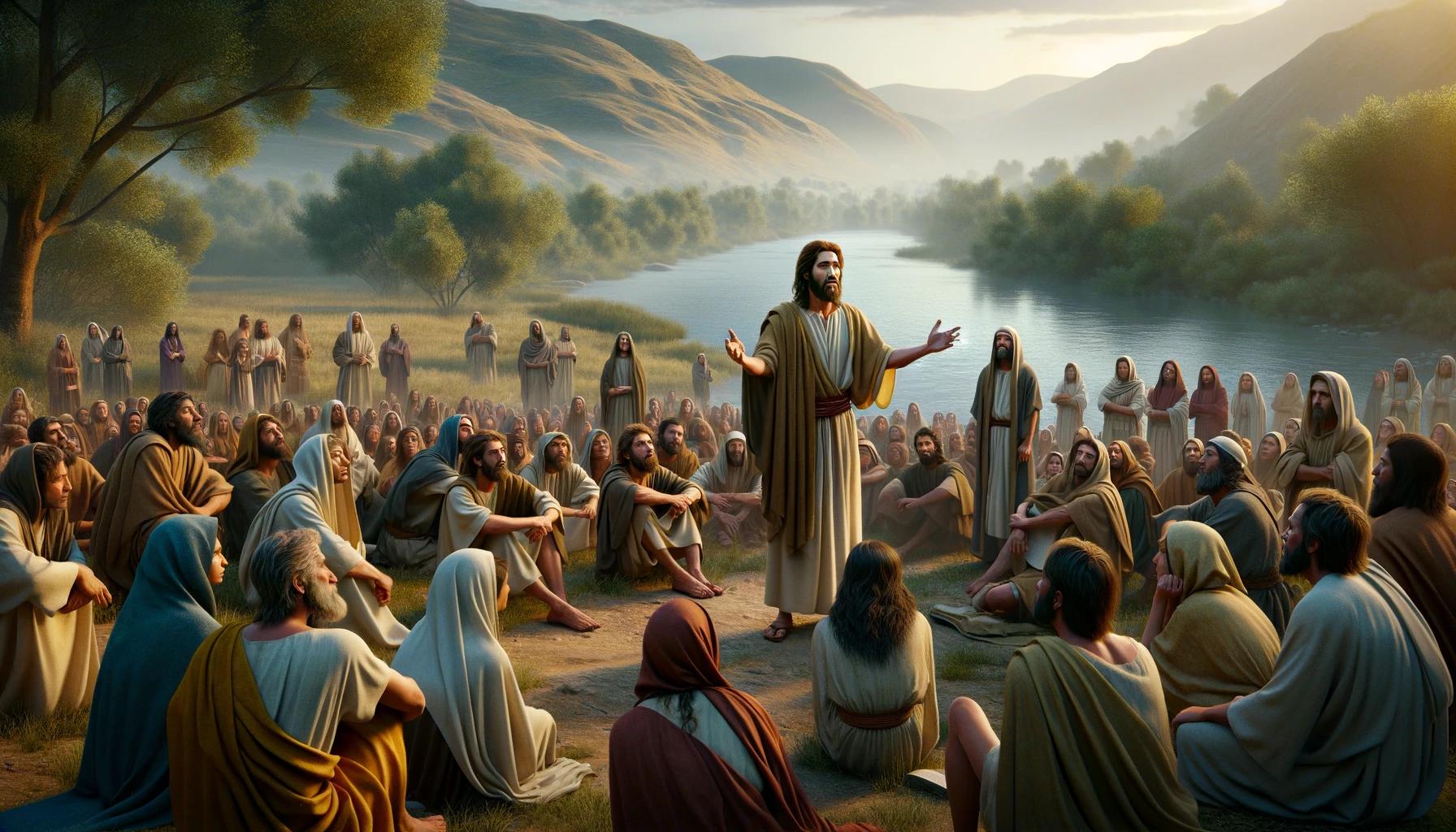Home>Theology and Spirituality>Where Did John The Baptist Come From


Theology and Spirituality
Where Did John The Baptist Come From
Published: February 20, 2024
Jason DeRose, Managing Editor at Christian.net, uses his expertise in religion and journalism to deepen understanding of faith's societal impacts. His editorial leadership, coupled with a strong academic background, enriches the platform’s diverse content, earning him recognition in both journalism and religious circles.
Discover the origins of John the Baptist and his significance in theology and spirituality. Explore his background and impact in religious history.
(Many of the links in this article redirect to a specific reviewed product. Your purchase of these products through affiliate links helps to generate commission for Christian.net, at no extra cost. Learn more)
Table of Contents
Introduction
The story of John the Baptist is one that resonates deeply within the Christian faith. His life and ministry are intertwined with pivotal moments in the New Testament, and his influence reverberates through the ages. Understanding the origins and significance of John the Baptist is essential for comprehending the broader narrative of Christianity.
John the Baptist, often depicted as a rugged figure in the wilderness, holds a revered place in Christian theology and spirituality. His birth, ministry, and role in the New Testament are rich with symbolism and meaning, offering profound insights into the unfolding of God's divine plan.
As we delve into the life of John the Baptist, we embark on a journey through the historical and spiritual landscape of ancient Judea. It is a journey that leads us to the banks of the Jordan River, where John's voice echoed with unwavering conviction, heralding the imminent arrival of the Messiah.
In exploring the life and legacy of John the Baptist, we encounter themes of prophecy, repentance, and the fulfillment of ancient promises. His story serves as a bridge between the Old and New Testaments, linking the prophetic traditions of the Hebrew scriptures to the dawn of a new era in Christian faith.
Join me as we embark on a captivating exploration of the enigmatic figure of John the Baptist, unraveling the mysteries of his birth, the profound impact of his ministry in the wilderness, and his enduring significance in the New Testament narrative. Through this journey, we will gain a deeper appreciation for the timeless relevance of John the Baptist and the profound spiritual truths encapsulated within his remarkable story.
Read more: Where Did John The Baptist Baptized
The Birth of John the Baptist
The birth of John the Baptist is a pivotal event in the Christian narrative, heralding the arrival of a figure whose life would intersect with the unfolding of divine providence. According to the Gospel of Luke, John's parents, Zechariah and Elizabeth, were devout and righteous individuals, yet they were childless, a source of deep sorrow in a culture where bearing children was highly esteemed.
One day, as Zechariah, a priest serving in the temple, was fulfilling his duties, an angel of the Lord appeared to him, announcing that his prayers had been heard and that his wife, Elizabeth, would bear a son. This son, the angel declared, would be named John and would be filled with the Holy Spirit from birth. Furthermore, the angel proclaimed that John would go before the Lord "in the spirit and power of Elijah" to turn the hearts of the fathers to their children and the disobedient to the wisdom of the righteous, thus preparing a people for the coming of the Lord.
Zechariah, initially incredulous due to his and Elizabeth's advanced age, was struck mute by the angel as a sign of the veracity of the divine message. True to the angel's words, Elizabeth conceived and bore a son, whom they named John, as the angel had commanded.
The birth of John the Baptist, foretold by the angel and accompanied by miraculous signs, signified the dawning of a new era in the divine plan of salvation. John's birth was not merely a joyous occasion for his parents, but a profound fulfillment of ancient prophecies and a prelude to the arrival of the long-awaited Messiah.
The circumstances surrounding John's birth, from the divine announcement to his parents to the miraculous conception in Elizabeth's advanced age, imbue his story with a sense of divine purpose and destiny. John's birth serves as a testament to the power of God to bring forth life and fulfill His promises, even in the most improbable of circumstances.
The birth of John the Baptist, shrouded in divine intervention and imbued with profound significance, sets the stage for the remarkable life and ministry of a figure who would ultimately prepare the way for the coming of Jesus Christ, the central figure of the Christian faith.
John's Ministry in the Wilderness
John the Baptist's ministry in the wilderness stands as a defining chapter in the narrative of Christian history. Emerging from the annals of ancient prophecy, John embarked on a mission that would reverberate through the ages, drawing multitudes to the banks of the Jordan River.
In the wilderness, John proclaimed a message of repentance, calling upon the people to turn from their ways and prepare for the imminent arrival of the Messiah. His voice, resonating with unwavering conviction, echoed across the rugged terrain, drawing the attention of seekers and skeptics alike.
Clad in a garment of camel's hair with a leather belt around his waist, John embodied the prophetic tradition of old, evoking the image of Elijah, the revered prophet of Israel. His ascetic lifestyle and unyielding commitment to his divine calling lent credence to his message, compelling people from all walks of life to heed his words.
The act of baptizing individuals in the waters of the Jordan River became synonymous with John's ministry, symbolizing a spiritual cleansing and a symbolic rebirth. This ritual of immersion signified a profound turning point in the lives of those who partook in it, marking a conscious decision to embrace repentance and prepare for the coming of the Messiah.
John's ministry in the wilderness was not confined to mere words and rituals; it embodied a profound spiritual awakening that stirred the hearts of the people. His message transcended societal boundaries, resonating with the religious elite, humble laborers, and even Roman soldiers, all of whom were drawn to the authenticity and urgency of his proclamation.
The wilderness, with its rugged terrain and stark beauty, served as a fitting backdrop for John's ministry, underscoring the transformative nature of his message. It was in this untamed expanse that John's voice pierced the silence, heralding a message of hope and redemption, and beckoning the people to prepare their hearts for the arrival of the long-awaited Messiah.
As we contemplate John's ministry in the wilderness, we are confronted with the timeless relevance of his message. His call to repentance and spiritual renewal transcends the boundaries of time and culture, resonating with the deepest longings of the human soul. In the wilderness, John the Baptist emerged as a herald of divine truth, preparing the hearts of the people for the dawn of a new era in the unfolding drama of salvation.
John's Role in the New Testament
John the Baptist's role in the New Testament is profoundly significant, as his life and ministry intersect with pivotal moments in the narrative of Jesus Christ. His influence reverberates through the pages of the Gospels, shaping the trajectory of the Christian faith and illuminating the path for the arrival of the Messiah.
In the New Testament, John the Baptist emerges as a central figure in the unfolding drama of salvation. His ministry, characterized by a fervent call to repentance and spiritual renewal, serves as a prelude to the ministry of Jesus Christ. The Gospels depict John as the prophetic voice in the wilderness, fulfilling the ancient prophecies that heralded the coming of the Messiah.
John's pivotal role is encapsulated in his proclamation of Jesus as the Lamb of God who takes away the sins of the world. This profound declaration, uttered upon seeing Jesus approaching the Jordan River, underscores John's recognition of Jesus' divine mission and sets the stage for the revelation of Christ's redemptive purpose.
Furthermore, John's baptism of Jesus in the Jordan River marks a transformative moment in the New Testament narrative. As Jesus emerges from the waters, the heavens open, and the Spirit descends upon him like a dove, affirming Jesus' identity as the beloved Son of God. This sacred event serves as a pivotal inauguration of Jesus' public ministry, signaling the commencement of his redemptive mission.
John's unwavering commitment to his divine calling and his pivotal role in preparing the way for Jesus exemplify his profound significance in the New Testament. His fearless proclamation of truth and his selfless dedication to fulfilling his prophetic mandate resonate throughout the Gospels, underscoring the timeless relevance of his message.
In the broader scope of the New Testament, John the Baptist's role serves as a bridge between the prophetic traditions of the Old Testament and the fulfillment of God's promises in the person of Jesus Christ. His life and ministry embody the continuity of God's redemptive plan, linking the prophetic anticipation of the Messiah with the advent of the long-awaited Savior.
As we navigate the landscape of the New Testament, John the Baptist emerges as a herald of divine truth, a precursor to the ministry of Jesus, and a timeless symbol of unwavering faith and obedience. His role in the New Testament narrative transcends the confines of history, resonating with the eternal truths of God's redemptive love and the enduring hope found in the person of Jesus Christ.
Conclusion
In conclusion, the enigmatic figure of John the Baptist emerges as a profound and enduring symbol of divine purpose and fulfillment. His birth, foretold by an angel and accompanied by miraculous signs, signifies the unfolding of God's redemptive plan and the fulfillment of ancient prophecies. John's ministry in the wilderness, characterized by a fervent call to repentance and spiritual renewal, resonates with timeless relevance, transcending the boundaries of time and culture. His unwavering commitment to his prophetic calling and his pivotal role in preparing the way for Jesus Christ underscore the profound significance of his life and ministry in the New Testament narrative.
The story of John the Baptist serves as a bridge between the prophetic traditions of the Old Testament and the fulfillment of God's promises in the person of Jesus Christ. His proclamation of Jesus as the Lamb of God and his baptism of Jesus in the Jordan River mark transformative moments that set the stage for the revelation of Christ's redemptive purpose. John's enduring legacy as a herald of divine truth and a precursor to the ministry of Jesus Christ resonates with the eternal truths of God's redemptive love and the enduring hope found in the person of Jesus Christ.
As we reflect on the life and legacy of John the Baptist, we are confronted with profound spiritual truths encapsulated within his remarkable story. His unwavering faith, his fearless proclamation of truth, and his selfless dedication to fulfilling his prophetic mandate serve as timeless examples of obedience and devotion. John the Baptist stands as a testament to the enduring power of faith and the profound impact of a life surrendered to the divine will.
In unraveling the mysteries of John the Baptist's birth, the profound impact of his ministry in the wilderness, and his enduring significance in the New Testament narrative, we gain a deeper appreciation for the timeless relevance of his story. His life and ministry embody the continuity of God's redemptive plan, linking the prophetic anticipation of the Messiah with the advent of the long-awaited Savior. John the Baptist's legacy transcends the confines of history, resonating with the eternal truths of God's redemptive love and the enduring hope found in the person of Jesus Christ.















